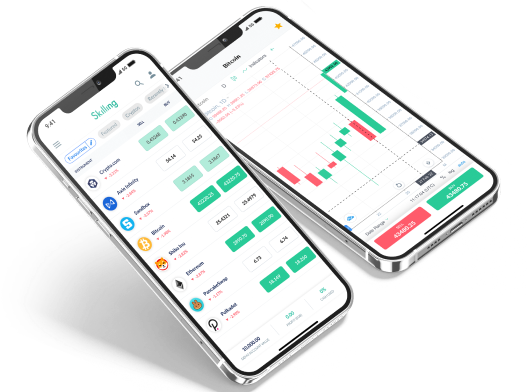Liquidation is another concept in the world of trading and finance. This article will define what liquidation means, explore why it's important for traders, answer common questions about liquidation, and highlight how Skilling's platform can assist traders in managing liquidation risks.
Experience Skilling's award-winning platform
Try out any of Skilling’s trading platforms on the device of your choice across web, android or iOS.

What does liquidation mean?
In financial terms, liquidation refers to the process of converting assets into cash or cash equivalents by selling them on the market. In the context of trading, liquidation specifically refers to the closing of positions, either voluntarily by the trader or forcibly by the broker, usually when a margin call occurs. This process is essential for settling debts, meeting margin requirements, or preventing further losses in trading accounts.
Example of voluntary liquidation:
A trader might voluntarily liquidate a position in a stock when they believe the stock has reached its peak potential. For instance, if a trader bought shares at $50 each and the price rises to $70, they might decide to sell (liquidate) their shares to realize the profit.
Example of forced liquidation:
Forced liquidation occurs when a trader's account falls below the required margin level. For example, if a trader using leverage has a significant loss, and their account balance can no longer cover the margin requirement, the broker may forcibly close (liquidate) their positions to prevent further losses and settle the account's debt.
Why does liquidation matter to traders?
For traders, particularly those engaging in margin trading or managing diverse portfolios, understanding the nuances of liquidation is crucial. Liquidation is not just about closing positions; it's about strategic decision-making that can significantly impact financial outcomes. Whether it's a response to market changes, a move to capitalize on gains, or a necessary action to prevent further losses, liquidation plays a central role in portfolio management. It directly affects a trader's capital, risk exposure, and potential for future investments.
Additionally, the broader market implications of liquidation, such as its impact on asset prices and market liquidity, are vital considerations for any trader looking to navigate the markets effectively.
What's your Trading Style?
No matter the playing field, knowing your style is the first step to success.

FAQs
1. What triggers a liquidation in trading?
Liquidation can be triggered by a margin call, significant losses, or a trader's decision to close positions for profit or loss mitigation.
2. How can traders avoid forced liquidation?
Maintaining adequate margins, setting stop-loss orders, and careful position management can help avoid forced liquidation.
3. Does liquidation always result in a loss?
Liquidation can result in either a loss or a profit, depending on the position's performance at the time of closing.
4. How does liquidation affect market volatility?
Large-scale liquidations, especially forced ones, can contribute to increased market volatility.
5. What impact does liquidation have on a trader's portfolio?
Liquidation can significantly impact a trader's portfolio, either by locking in profits, cutting losses, or altering the risk profile of the portfolio.
6. Can liquidation be part of a strategic trading plan?
Yes, strategic liquidation can be used to rebalance a portfolio, take advantage of market conditions, or manage tax implications.
7. How do brokers handle forced liquidation?
Brokers typically handle forced liquidation by automatically closing out positions when a trader's account falls below the required margin level.
8. What role does market liquidity play in liquidation?
Market liquidity can affect the ease and impact of liquidation. In highly liquid markets, liquidation is generally smoother and less likely to significantly impact market prices.
9. Are there any tools to help manage liquidation risk?
Many trading platforms offer tools like margin calculators, real-time alerts, and risk management features to help traders manage liquidation risk.
Maximize your trading potential with Skilling
Skilling provides traders with the tools and resources to effectively help manage liquidation risks. The platform offers features like real-time margin monitoring, trading articles, and educational resources to help traders make informed decisions and maintain the health of their trading accounts. Whether you're a beginner or an experienced trader, Skilling supports your trading journey with a user-friendly interface and comprehensive market analysis.











